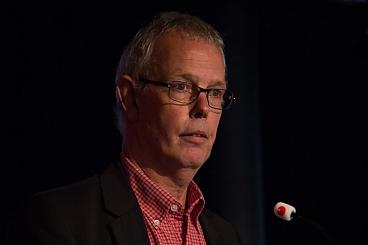SP Senator Kox: Care needed in Eastern Europe
SP Senator Kox: Care needed in Eastern Europe

Now that tension is rapidly rising in the former Yugoslav Republic of Macedonia, the international community will have to be careful not to repeat the mistake of attempting to impose solutions from outside of the country. It’s up to the citizens and government of Macedonia to put an end to the political chaos and prevent a violent escalation. On an initiative of the political group led by SP Senator Tiny Kox, the United European Left, the Parliamentary Assembly of the Council of Europe (PACE) this week met in Sarajevo to hold extensive talks about the serious political disruption afflicting Council of Europe member state Macedonia.
Macedonia is one of the new states which came into existence following the disintegration of Yugoslavia in the 1990s. Kox recalls that the implosion was the exact opposite of a successful separation. ‘With ethnic clashes, a bloody civil war, outside interference and controversial international military interventions - and a number of newly-created, weak, unstable states as the end result. Macedonia is one example, along with Bosnia and Kosovo. In Macedonia an authoritarian government spies on tens of thousands of the country’s private citizens, but also on politicians and administrators. And a section of the opposition has been boycotting parliament since the day of the elections, scandalised by the monitoring and wiretapping practices of the government. Yet these same people themselves happily published illegally acquired transcripts of the telephone conversations which had been tapped. They did this in the hope of forcing the government to resign. The streets of the capital, Kopje, are full of demonstrators from various sides and unrest is growing elsewhere in the country. Numerous different elements are trying to crank up the tensions between ethnically Albanian and Macedonian citizens. Recently more than twenty people have lost their lives. Step by step a really dangerous cocktail is being mixed, one which could simply explode without any warning.’
That danger is becoming still greater, says Kox, as major powers such as the United States, Russia and the European Union meddle in the conflict in order to further their own interests. 'Russia and America see a strategic interest in this small country wedged between Serbia, Bulgaria, Greece and Albania. Russia wants to run a new pipeline over Macedonian territory. The Americans want to see the country annexed by NATO. Macedonia is also keen to join the European Union, but that’s difficult with an unstable executive, widespread corruption, a weak economy and a conflict dragging on with its neighbour Greece over the name “Macedonia”, because this is also what northern Greece is called.’
Together with other representatives from the Council of Europe Kox is calling for international restraint in these dangerous times. ‘Let the great powers hold off and give the government and opposition in Macedonia the chance to put things in order,’ he says. ‘Where necessary with the support of the Council of Europe, to which the country does after all belong.’ The call won support from Council of Europe Secretary-General Thorbjørn Jagland, who stated as much in Sarajevo. Earlier in the week Jagland spoke in Brussels with the Foreign Ministers of the Council of Europe’s member states, amongst them Russia’s Sergey Lavrov, Dutch Minister Bert Koenders and Bosnia’s Boris Crnadak, who from this week will occupy the six-monthly rotating Council of Europe presidency. In response to Kox’s questions in Sarajevo, the Bosnian Foreign Minister promised to do all he could to help Macedonia to overcome this crisis. In June he will travel to Strasbourg to report to the PACE plenary, in which forty-seven European countries are represented.
- See also:
- Europe
